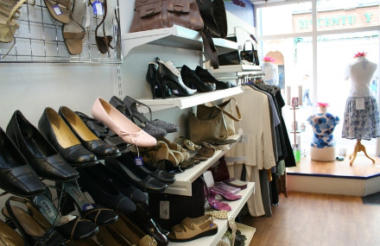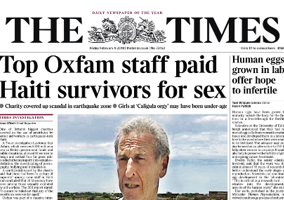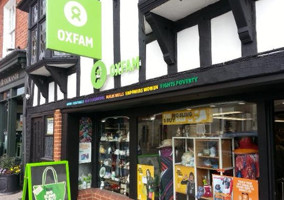Britain’s largest charity shops chains have looked into more than 230 allegations relating to safeguarding concerns over the past five years, according to BBC 5 Live Investigates.
The investigation, broadcast yesterday and presented by Adrian Goldberg, surveyed 10 of the UK’s biggest charities, which included Oxfam, British Red Cross, Barnardo’s and Cancer Research UK and found that collectively they have internally investigated 236 cases over the past five years.
Some charities were only able to provide figures for the last 12 months so 5 Live said the real figure is likely to be higher.
The broadcast said that some charities could not say whether the victims were staff, volunteers, and sometimes how old they were.
5 Live did not name all ten charities that it questioned, but according to the Charity Shops Survey 2017, published by Civil Society Media, the largest ten charity retail chains have a combined network of nearly 4,500 shops. They employ about 8,500 staff and around 100,000 volunteers.
According to the investigation, at least 11 of the 236 reported victims were children.
Of those investigated, Oxfam had the highest figure, with 150 safeguarding complaints over five years and 63 of those upheld.
5 Live did not say how many of the 236 cases were upheld.
The broadcast said: “Oxfam told us they do take safeguarding extremely seriously and they do have systems in place to protect their shops staff and volunteers.”
Barnardo’s reported 14 alleged incidents of sexual harassment and sexual assault associated with the running of their charity shops, with nine of those inside the shops.
Six of the alleged victims were young volunteers, aged just 15 and upwards.
The broadcast said: “They told us all allegations of misconduct are fully and immediately investigated and that they do take action if they need to.”
British Red Cross recently reported that 15 of its 20,000 UK volunteers, including six retail volunteers, were investigated over the past year for incidents related to sexual misconduct. This resulted in 11 dismissals, including all those based in shops.
The charity is currently investigating three members of the its UK-based staff due to allegations related to sexual misconduct.
'Uplift in calls from the charity sector'
Georgina Halford-Hall, chief executive of Whistleblowers UK, said her organisation had received an “astronomical uplift” in calls from the charity sector since the Oxfam scandal broke last month.
She said: “We’ve been receiving on average one or two a month over the past year or so but we’ve had in excess of 30 in the past two and a half weeks. They are reporting a mixture of financial irregularities and areas around misconduct. Sexual harassment, bullying, they are the usual ones.”
Halford-Hall also suggested that the charity sector was a magnet for predators.
"It's almost as if regulation for them is deemed unnecessary because, of course, everybody who works there would be nice," she said. "Those who say the unspeakable about areas where we have traditionally been sympathetic are not welcome.
"And yet those are the areas that attract people who are predatory, they're exploitative - all of the evidence supports this."
She added: "We've heard about inappropriate relationships between members of staff, between staff and volunteers and also volunteers raising concerns about the way staff have interacted with vulnerable children and teenagers."
Better regulation needed
Halford-Hall criticised the Charity Commission, suggesting that its reporting system did not encourage people to come forward with complaints.
She said: “They don’t have a whistleblower hotline, they have a reporting system which is accessed through the internet.
“One of the questions it asks you is do you have any documents. Most people, particularly witnesses of sexual harassment or bullying, don’t have paper trails. If you say no, the Charity Commission website closes down and says 'we will not be able to help you with this'.
“At the moment, the Charity Commission has in excess of 200 cases that have not been allocated to a case worker.”
The programme said that the Charity Commission declined an invitation to appear on it but said they are reviewing the way they communicate with those who bring vital information to them that leads to serious regulatory action.
The programme said: “They acknowledge that whistleblowers who have gone to them with serious concerns about charities are not always made aware of the difference their reports have made. But they should be reassured that where appropriate their concerns have been acted on.”
Commission responds
The Commission told Civil Society News it was speaking to 5 Live about the accuracy of some of the points made in the programme and that it is already exploring ways to improve how it communicates with people.
A Charity Commission spokesman said: “We have a dedicated whistleblowing email address on our home page and a robust system for handling concerns raised, but we are not complacent and regularly review our policies. We commissioned an internal audit on our whistleblowing procedures which reported in June 2016 and identified no major weaknesses.
"We have updated our web guidance to make it more accessible to potential whistle-blowers and took advice from Public Concern at Work (PCAW) to ensure this was in line with best practice. PCAW have also run training sessions for our staff. As well as looking at our own processes, we have highlighted the importance of charities developing their own systems for concerns to be raised internally, and the need for cultures that match. We would welcome further engagement with PCAW on this matter and wholeheartedly encourage anyone working in a charity who has concerns to come forward.”
Helen Stephenson, chief executive of the Commission, has previously announced that the regulator is reviewing the way it communicates with those who bring it information that leads to serious regulatory action. She said: “It has become clear to us, over the past few weeks that whistle-blowers who come to us with serious concerns about charities are not always made aware of the difference their reports have made.
"People who make what is often a brave decision to come to the regulator with important information, should, where appropriate, be reassured that we have acted on their concerns. So I want us to look carefully at the way in which we communicate with those who bring vital information to us that leads to serious regulatory action.”
Criminal record checks
The programme reported instances of some convicted paedophiles volunteering or working in charity shops and raised the issue of some shops not undertaking criminal records checks.
Karl Wilding, director of public policy and volunteering at NCVO, said the law around whether charities are allowed to undertake Disclosure and Barring Service (DBS) check “is surprisingly complicated” and suggested a changes to the law should be considered.
Wilding told the programme that while any instances were unacceptable, “the fact that charities are encouraging a culture of whistleblowing, encouraging staff to report incidences, I think is a good thing”.
He said: “If we want charities to be transparent, we are going to hear more about these sorts of things.”
After the programme, the Charity Retail Association issued a statement saying it has advice and guidance to help its members ensure staff and volunteers are properly vetted.
A spokesman said: “The law prohibits DBS standard and enhanced checks to be carried out for all roles – they can be undertaken only for positions involving certain types of work including work with young people and vulnerable adults.
“As part of our guidance we advise that a combination of checks should be carried out for each role, and that every case should be considered on its own merits.
“It is of course very much in our members’ interests to recruit staff and volunteers with integrity, and to ensure that staff, volunteers and the general public have the utmost confidence in charity shops as safe places in the community to work, volunteer and shop.”
A statement published on the British Heart Foundation's website published on Saturday said: "Some reports have questioned the use of DBS criminal record checks in charity recruitment. But none of our retail employees and volunteers are legally eligible for an enhanced or standard DBS check, although we are looking in to alternatives."
The British Red Cross said that 15 of its 20,000 volunteers had been investigated in relation to sexual harassment or misconduct in the past year, resulting in 11 dismissals. Of this six were retail volunteers and one was dismissed. The charity said it had three ongoing investigations into sexual misconduct by staff but none relate to its charity shops.
Editor's note: This story has been updated to include the British Red Cross statement and clarify that some charities had provided the level of detail requested by the programme
|
Related articles












